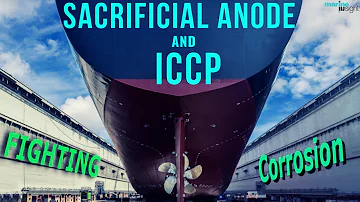What is the ICCP?
Table des matières
- What is the ICCP?
- Where is ICCP used?
- What is impressed current cathodic protection on ships?
- How does impressed cathodic protection work?
- What is impress current?
- What is anodic passivation?
- What is an impressed current?
- Why we switch off ICCP in port?
- How are metals protected by impressed current method?
- Why ICCP is switched off in port?

What is the ICCP?
Impressed current cathodic protection (ICCP) is a corrosion protection system consisting of sacrificial anodes connected to an external power source. The external power source, often a DC power supply, provides the current necessary to drive the electrochemical reaction required for cathodic protection to occur.
Where is ICCP used?
Fixed structures such as harbour quay walls, jetties, locks, offshore oil and gas rigs and Offshore Wind Farms can be protected with sacrificial anodes or ICCP systems.
What is impressed current cathodic protection on ships?
Impressed current cathodic protection (ICCP) on ships system make the hull to remain always cathode by keeping the Potential difference to a minimum and introducing a current opposite to the natural corrosion current, thereby protecting the anode and avoiding corrosion.
How does impressed cathodic protection work?
Impressed current cathodic protection is provided by connecting a DC power source between the metal being protected and the cathodic protection anodes. ... As with GACP, the cathodic protection current flows from the anode, through the electrolyte and onto the metal being protected.
What is impress current?
Impressed current is a type of cathodic protection utilizing electrochemical means to obtain protection against corrosion. ... The key in impressed current protection is to turn the whole structure cathodic in nature, or make it a current receiver rather than a current provider.
What is anodic passivation?
Corrosion Prevention Anodizing is an electrolytic passivation process used to increase the thickness of the natural oxide layer on the surface of metal parts.
What is an impressed current?
Impressed current is a type of cathodic protection utilizing electrochemical means to obtain protection against corrosion. ... The key in impressed current protection is to turn the whole structure cathodic in nature, or make it a current receiver rather than a current provider.
Why we switch off ICCP in port?
ICCP EFFICIENCY DEPEND ON THE SALINITY OF THE WATER. THIS IS BECAUSE IN SALINE WATER THE IMPEDANCE IS LESS WHICH ALLOW EASY FLOW OF CURRENT TO THE ANODES AND HELPS IN EFFICIENT PROTECTION OF THE HULL. HENCE IN PORTS OR IN FRESH WATER THE ICCP IS STOPPED. ...
How are metals protected by impressed current method?
Impressed Current Cathodic Protection The sacrificial anode method of protection uses a metal more active than the base metal to “sacrifice” ions. These “sacrificial anodes” (usual alloys such as magnesium, aluminum, or zinc) have a stronger electrochemical potential.
Why ICCP is switched off in port?
ICCP EFFICIENCY DEPEND ON THE SALINITY OF THE WATER. THIS IS BECAUSE IN SALINE WATER THE IMPEDANCE IS LESS WHICH ALLOW EASY FLOW OF CURRENT TO THE ANODES AND HELPS IN EFFICIENT PROTECTION OF THE HULL. HENCE IN PORTS OR IN FRESH WATER THE ICCP IS STOPPED. ...













